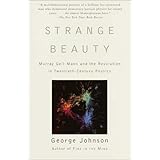
Average Reviews:

(More customer reviews)Several years ago I was having lunch with Murray Gell-Mann. He lamented that one day a biography of him would appear and no doubt it would be written by a fool who would get it all wrong.
This month the biography of Murray Gell-Mann, arguably the most influential physicist of the latter part of the twentieth century appeared, but it was neither written by a fool nor was it all wrong.
A few years back, I read James Gleick's celebrated biography of Richard Feynman (Genius), the other great physicist of the latter part of the twentieth century, and Gell-Mann's closest rival and colleague. I felt that it suffered greatly from a problem that faces many biographers, that is, writing about someone you have never met. Gleick never met Feynman, much less knew him, and therefore it provided a distorted picture of the man. I never felt that Feynman's personality and thought process came through. Many of Feynman's closest intimates and family felt the same way and were more than disappointed by the biography.
In contrast, when I read George Johnson's recent biography of Murray Gell-Mann (Strange Beauty), I couldn't help thinking, "That's Murray!" "Yes, that's Murray!" (Recently I spoke with some close friends of Gell-Mann who felt the same way.) Author Johnson did have the opportunity to spend a considerable amount of time with Gell-Mann and that certainly comes through. To a large degree you will get a strong sense of what Gell-Mann's personality is like. He can be extremely formidable, sarcastic with distinguished rivals as well as fools (he does not suffer fools gladly) and arrogant (adapting a phrase from Issac Newton, he once said, the reason I can see further than others is because I am surrounded by dwarfs).
Yet, as Johnson points out, Gell-Mann is also a man who is also continually tormented by his own insecurities. Here is a man who has every reason to boast, and should not be insecure about his achievements. His contributions to theoretical physics during the second part of the twentieth century are legendary and perhaps unrivaled. Feynman paid Gell-Mann the ultimate complement after Gell-Mann was awarded the Nobel Prize in 1969, "Our knowledge of fundamental physics contains not one fruitful idea that does not carry the name of Murray Gell-Mann."
The complex relationship between these two intellectual giants of physics, Gell-Mann and Feynman, warrants discussion. The two were close colleagues at the California Institute of Technology for almost thirty years. They started as close friends and then drifted apart. In this one area, I felt that Johnson did not fully understand the complex relationship and dynamic between the two men, both of whom I got the chance to know fairly well. One does get some brief glimpses of Gell-Mann's frustrations of their relationship, but one does not have any insight into Feynman's position. The author permits a treatment of Feynman that comes across a bit harsh and unsympathetic. This may be due to the fact that Johnson was only exposed to Gell-Mann's constant harping about Feynman.
There is another aspect of Gell-Mann's character, which perhaps does not come across enough in this fine book. Gell-Mann can be a very warm, charming and tremendously giving person to his friends and others in need of help. He is also extremely passionate about making the world a better place, by spending an enormous amount of his time involved in various important educational and environmental issues. In spite of Gell-Mann's apparent social lapses, he has done a great deal in a positive way for the world and for the friends who surround him.
It would be impossible to author a biography of Gell-Mann without discussing the many contributions he has made to the world of theoretical physics. In this regard, without reference to a single mathematical equation, Johnson has done an extremely admirable job for the interested reader. Gell-Mann's physics and insight come through in an extremely readable way without the sort of egregious errors that are often made when scientific popularizations distill complicated scientific thought. I couldn't find any fault with the scientific issues that were being discussed.
What does Gell-Mann think of the book? In typical Gell-Mann fashion, he stated to me, "There's a mistake on every page." Nevertheless, the "mistakes" that he pointed out were of a rather trivial nature and do not detract from the overall picture of the man and his accomplishments. In conclusion, this is an immensely readable and enjoyable book. I couldn't put it down, nor could any of Gell-Mann's close friends who spoke to me about it! It's really great! Full of insight, fun, drama, and everything else you could wish for in a biography of a truly remarkable man, who has contributed to our understanding of the universe in a very fundamental way.
Click Here to see more reviews about: Strange Beauty: Murray Gell-Mann and the Revolution in Twentieth-Century Physics

No comments:
Post a Comment